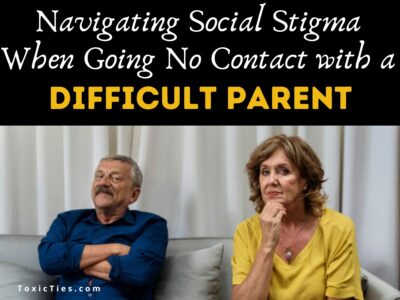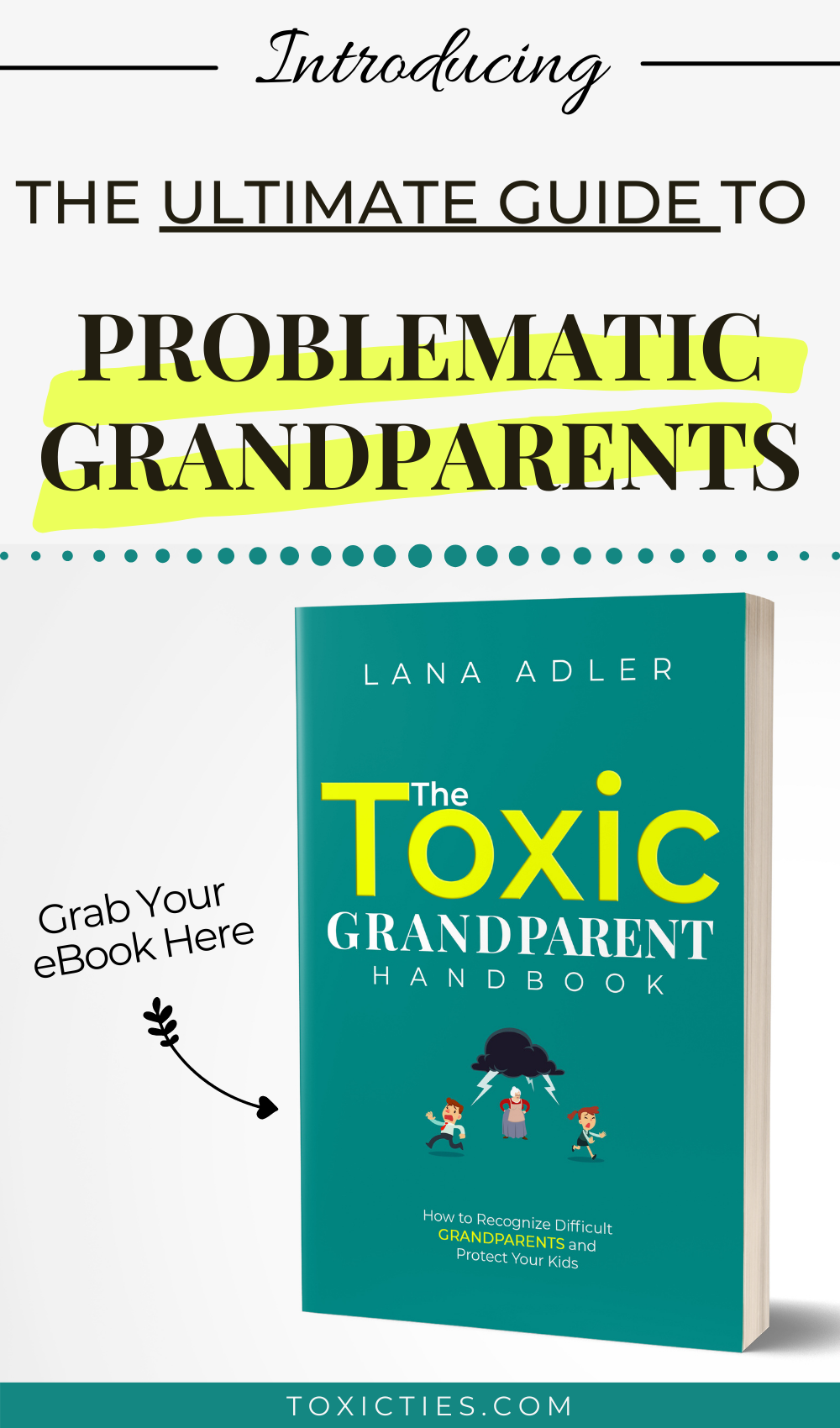As humans, we are programmed to seek love and validation. That need is especially strong during childhood, when we are still forming ideas about who we are (“self-schemas”). But if you had a narcissistic parent, these needs likely went unmet.
As a result, you keep seeking that validation from your parent — whether consciously or unconsciously — as an adult, only to be hurt and disappointed over and over again.
A narcissistic parent, with their inability to recognize and mirror their child’s needs, is not the best source of unconditional love. So it’s time to stop expecting it or trying to “earn” it.
This article will help you do just that.
But first, let’s answer the obvious question: what are the signs that you have a narcissistic parent?
Signs You Have a Narcissistic Parent
Everyone is a little narcissistic in their own way. We all love praise and tend to put ourselves first when given an opportunity. The problem is when this natural narcissism gets out of control and one’s actions come at the expense of others.
Or in this case, at the expense of one’s children.
So let’s deconstruct what it means to have a narcissistic parent, and what kind of experiences you’ve likely had with them.
If you have a parent with narcissistic traits, he or she
- neglects your emotional needs
- never admits fault, apologizes, or accepts a different point of view
- demands total admiration and obedience from their children
- unfavorably compares you to other people
- puts their needs and feelings first
- constantly tries to manipulate you to get their way
- gives you cold shoulder whenever you show independence
- says hurtful and derogatory things when they’re mad at you
- obsessed with their public image
- is hypersensitive to any criticism or the slightest display of defiance
- tries to make you feel guilty for all the things they do for you
- fabricates ailments to be the center of attention
- is loving one minute, only to turn vicious the next
- hypercritical of everything you do
- is jealous of you and threatened by your success
- punishes you with the silent treatment to teach you a lesson
- minimizes or ignores your accomplishments
- has to control every aspect of your life
- displays a total lack of empathy
- monopolizes your time and lacks boundaries
- only cares about how you make them look
- has difficult relationships with most people in their life
- disregards your wishes and undermines you
- could be described as arrogant, self-centered, and entitled
- is totally oblivious to the pain they cause.
These are major signs that you may be dealing with a narcissistic parent.
Even if your parent doesn’t display every single sign, it all boils down to this: a narcissistic parent will put you down to make themselves feel superior and fail to recognize your needs and feelings most of the time.

Coming to Terms With Having a Narcissistic Parent
Unfortunately, narcissistic parents have no awareness of their shortcomings, despite the major detrimental effect on their children. That’s why they’re never going to change or apologize for the pain they’ve caused.
However, don’t assume that you need their acknowledgment or apology. Identifying your parent as a narcissist can be the turning point of your life in itself. It’s when you realize that your childhood wasn’t normal and the way your parent treated you was abuse.
This is a difficult realization. You may feel confused, angry, devastated, and even guilty for questioning your parent’s character.
But finally seeing them for who they are can also be incredibly liberating.
For one, you may no longer feel that something is wrong with you or that you are a failure. You might realize that character traits you thought were personal flaws aren’t actually your fault. They could be the legacy of growing up with a narcissistic parent.
It can also be a way to see your parent through a prism of compassion. Understanding their behavior in terms of illness or dysfunction can help you put emotional distance between you and your parent.
Narcissism is an affliction. Narcissistic people don’t choose to be narcissistic. However, they are still accountable for their actions.
Understanding that can help you come to terms with your narcissistic parent and your personal history with them.

Why You Keep Seeking Validation From a Narcissistic Parent
Even after you’ve identified your parent as narcissistic, you will likely still seek love and validation from them.
It’s not your fault. It doesn’t mean you’re stupid or masochistic. Having been raised in a narcissistic household, your whole life you’ve been trained to do just that.
Your parent’s putdowns, criticism, negative comparison to others, withholding of affection — all of it conditioned you to desperately try to earn your parent’s affection and approval.
In a family where one sibling is a “golden child” and another one is a “scapegoat“, this dynamic is particularly apparent. No matter how hard the scapegoat tries, they always come up short in the parent’s eyes.
However, constant rejection is a motivation killer. So sometimes your parent might give you scraps of affection, almost as if to say: “Don’t give up. If you really try, you may still earn my approval.”
For example, after you’ve done something “right,” your parent may act like they’re proud and satisfied. It will feel like they’re finally acknowledging you and giving you the love you’ve been deprived of.
But it’s always short-lived. Very soon their pride turns into familiar disapproval and disappointment.
So essentially, it’s a trauma bond relationship. The narcissist oscillates between abuse and affection, keeping you stuck in an addictive cycle.
To stop seeking validation from your narcissistic parent means to break free from the cycle.

How to Stop Seeking Validation From a Narcissistic Parent
We’ve explored where seeking your narcissistic parent’s approval comes from and how it’s nurtured and reinforced throughout your life.
But how can you stop? How can you get off the merry-go-round if you have a deep, innate desire to receive love and validation from your parents? Is there a way to meet these essential needs without relying on your parent (or anybody, for this matter)?
Well, there is.
First, age does bring wisdom. As you grow older, you inevitably become more aware and frustrated with how your parent treats you. So you may be less and less willing to jump through their hoops for scraps of approval.
Second, you may have heard that self-validation and self-esteem can come from external or internal sources.
External Vs. Internal Validation
External validation is when someone gives you a compliment, praises your work, pays attention to you, etc. Or when a narcissistic parent shows you affection when you do what they wanted you to do. This feels nice but it’s also a trap.
External validation is an unreliable source of self-esteem because it comes from people, and people are fickle and unpredictable creatures. They can change their minds, dislike you for personal reasons or insecurities, misunderstand you (like many great artists were misunderstood in their time), etc.
Internal validation, on the other hand, comes from within. It’s when you shift from looking to others to give you “attaboy” or “attagirl” points to positive thoughts about yourself. It’s cultivating self-compassion and self-acceptance. So when things get tough or you fail, you can rely on your own inner strength to pick yourself up and move forward.
External validation can be a part of what makes you feel good about yourself. But don’t allow it to be the main part. Practice praising yourself even for the small, mundane things like waking up early or making the bed in the morning. It will build the habit of positive self-regard, which is the source of internal validation.
This way, you’ll gradually stop seeking love and approval from your narcissistic parent and start relying on your own feelings of self-worth.
Don’t you think it’s time to adopt some new behaviors and stop setting yourself up for disappointment?
As you deal with the emotional fallout of not having the approval of your narcissistic parent, here are a few key points to keep in mind.
You Can’t Change Them
The first step of learning how to stop seeking validation from your narcissistic parent is to come to terms with the reality of who your parent really is.
Unfortunately, unless they seek out professional help, they likely will not turn a new leaf and begin treating you with the love and nurturing you deserve.
Remember that story about the frog and the scorpion? You simply shouldn’t expect the scorpion not to sting. It is their nature.
Make Yourself a Priority
You may have not received the support you needed as a child and even as an adult. But it is never too late to make yourself your main priority.
The only validation you need is from yourself. That’s the only kind of validation that’s stable and reliable. So above all else, be kind to yourself and appreciate yourself for the wonderful person that you are.
And remember — those who truly love and accept you will never belittle or manipulate you for their own personal gain.
Don’t Confront
There is no point in confronting your narcissistic parent about their behavior. They will just get defensive and angry, and you will end up arguing.
What’s more, they will play the victim and try to turn everyone against you, kicking up a stick about how you attacked them for no reason, when they’ve been nothing but loving parents to you.
If you want to live a peaceful life, the only way to maneuver the relationship with a narcissistic parent is either through low contact or no contact.
Keep Supporting Individuals Around
This brings us to the next point: be selective with your company. Only surround yourself with those who have your best interest in mind.
It might feel hard to know who you can and cannot trust after being raised in a narcissistic environment. But when someone shows you authentic and unwavering support and friendship, you will just inherently know.
Having supportive individuals around is key in helping you stop relying on validation from your parents.
Establish Boundaries
It might not be feasible to completely cut out your narcissistic parent. But you can still set boundaries with them – especially if you have your own kids in the mix now.
Creating solid boundaries is vital when it comes to not seeking your parent’s validation. It’s a way for you to start prioritizing your needs and learning to be OK when someone doesn’t like it.
And don’t worry about offending your parents. If you are consistent, they will quickly learn that there are consequences to them crossing the lines you drew.
So every time they cross a boundary, you re-state it and follow through with the consequences.
For example, your narcissistic mother invites you to dinner. You say: I’d really like to come, but if I hear yelling (cursing, heavy drinking, insults, etc.), I will not be able to stay. So it’s really up to you if I come to dinner and spend time with you.
Be very clear and specific about the behaviors you won’t tolerate. This way you’re putting the responsibility on them whether or not you have contact.

Final Thoughts
It is not easy to come to terms with the fact that you have a narcissistic parent. It may induce a lot of questions, feelings, and confusion – it’s your parent, after all!
From the time that we are kids, we seek love and validation from the people raising us. It’s natural. But when narcissism is thrown into the mix, it can be impossible to receive that vital nurturing.
It’s difficult to accept, but if you do, you might finally stop looking for love and validation from your parent. Instead, you’ll start realizing that the only validation you need comes from within.
That’s the message I want to leave you with today.
However adverse your childhood experiences were, they do not result in fixed personality traits or predetermined destiny. People have a drive toward psychological development and healing. So even the most challenging experiences can be overcome.
Another thing to keep in mind is, child-parent relationships aren’t the only relationships we have in life. We are shaped and influenced by the totality of our experience, and that means there is always hope and forward movement.
There isn’t a set guidebook for how to undo all the trauma that narcissistic parents have placed on their children. But it’s important to know that it is never too late to break the cycle and embrace a life that is free from emotional control and neglect.
Always remember that your feelings are valid and that you are irreplaceable and utterly worthy of every ounce of love that you are given in this life.

References
Ni, P. (2016). 10 Signs of a Narcissistic Parent. Psychology Today.








I cannot tell you how useful these posts are. I feel liberated from reading them. And that my gut instincts have been validated. Now I need to work out next steps.
Thank you so much for your clear, wise advice. So helpful.
Grateful.